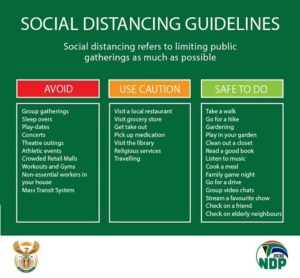With the COVID-19 spreading like a wildfire, we have been forced to pull the brakes on holiday travelling plans to limit exposure. But how do we survive self-isolation without losing our good health and minds as social creatures by nature?
The answer is simple, we face it head-on with a mind-over-matter approach! It’s best to follow all of the safety measures set out by the authorities and retreat from society. Every South African has a key role to play in the fight against the spread of this life-threatening virus, which has claimed over 16 000 lives across the globe in just over four months since December 2019.
What does self-isolation mean?
Simply put, it entails avoiding contact with other people to separate sick people from healthy people.
- Not going to work, school or public places;
- Not making use of public transport or taxis; and
- Not having any visitors, such as friends and family, over at your house.
If you need to leave your home, remember to stay at least 2 metres away from other individuals to limit your risk of potentially contracting the Coronavirus from unsuspecting carriers. The contrary also holds true – should you be an unsuspecting carrier of the virus, social distancing (and especially self-isolation) minimizes your chances of possibly infecting other people.
Should your local grocer offer delivery service during the lockdown period (depending on regulations imposed), it might be worth your while to consider signing up for online shopping:
- Pick ‘n Pay – visit https://www.pnp.co.za/ or call 0860 30 30 30
- Checkers – visit https://www.checkers.co.za/
- Woolworths - visit https://www.woolworths.co.za/, choose your delivery area, add your items to the cart and pay
They say that there’s no place like home. It definitely rings true now more than even as our homes will become the cocoons in which we safeguard our immune systems during self-isolation. With this in mind, it might be worth considering ways to prepare for and cope in these circumstances.
- Don’t panic-buy – just grab a few essentials
While panic-buying of food in the wake of the national Coronavirus disaster is an understandable reaction, this is completely unnecessary, says agricultural economist, Lunathi Hlakanyane. Most South Africans can’t afford to buy in bulk and should refrain from doing so, says Dr. Sifiso Ntombela, Chief Economist at the National Agricultural Marketing Council (NAMC). He adds that retailers and food distribution systems will remain fully functional, ensuring an uninterrupted supply of food throughout this period.
Remember to buy modest amounts of essentials you might need at home, such as:
- Toilet paper
- Hand sanitiser
- Disinfectant cleaners
- Disinfectant wipes
- Antiseptic liquids
- All-purpose cleaners
- Baby formula
- Disposable nappies
- Bleach
- Cooking oils
- Wheat flour
- Rice
- Maize meal
- Pasta
- Sugar
- Long-life milk
- Canned and frozen vegetables
- Canned, frozen, and fresh meat, chicken, and fish
- Bottled water
- Take care of your physical and mental health
To promote health and wellness in your home unit, remember to…
- Drink enough water to stay hydrated – Click here to find out how much water you should drink;
- Eat foods that boost your immune system (e.g. broccoli, garlic, ginger, almonds, spinach and citrus fruits);
- Stay in touch with family and friends over the phone or on social media to help you avoid feeling low or lonely;
- Try to keep yourself busy by sticking to a healthy routine – you could try activities like cooking, reading, doing an online course and watching series for entertainment;
- Exercise. The American Heart Association recommends adults engage in at least 150 minutes (two and a half hours) of moderate-intensity aerobic activity per week, or 75 minutes of vigorous aerobic activity per week. A combination of both would work too, preferably spread throughout the week;
- Do breathing exercises to maintain a calm and focused mind. You can practice equal breathing from a sitting or horizontal position – whichever is more comfortable for you. Then…
- Shut your eyes and pay attention to the way you normally breathe for several breaths.
- Slowly count 1-2-3-4 as you inhale through your nose.
- Exhale for the same four-second count.
- As you inhale and exhale, be mindful of the feelings of fullness and emptiness in your lungs.
3. Practice good hygiene
While you're staying at home, you should:
- Wash your hands with soap and water often, for at least 20 seconds.
- Use hand sanitiser gel if soap and water are not readily available.
- Cover your mouth and nose with your elbow, a tissue or your sleeve (not your hands) when you cough or sneeze.
- Discard used tissues in the bin straight away and wash your hands properly afterwards.
- Clean objects and surfaces you touch often (like door handles, kettles and phones) using your regular cleaning products.
- Wash your clothes after you have worn them – even if they don’t look dirty to the naked eye. When it comes to bacteria and viruses, looks can be deceiving.
4. Social distancing is key
Practise the principle of social distancing to avoid potential exposure to the virus.

5. Reach out for support if needed
Equip yourself with the latest news, updates and precautionary measures to curb the spread of the COVID-19 virus. But be sure to consult reputable sources of information. You can even save the Government’s COVID-19 Support number (060 012 3456) on WhatsApp and message the contact by saying “Hi”. You will then receive a menu response, where you will find all the latest updates on cases, prevention methods, symptoms and more.
Stay safe!



